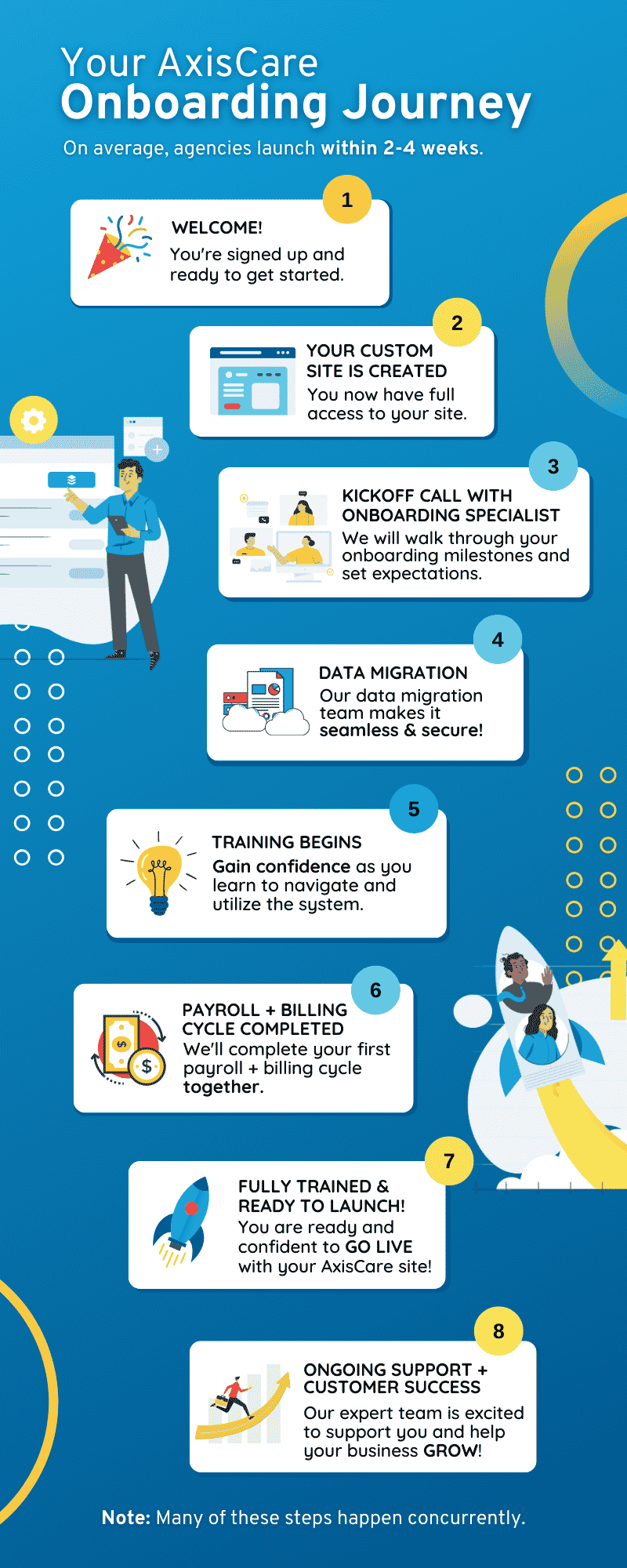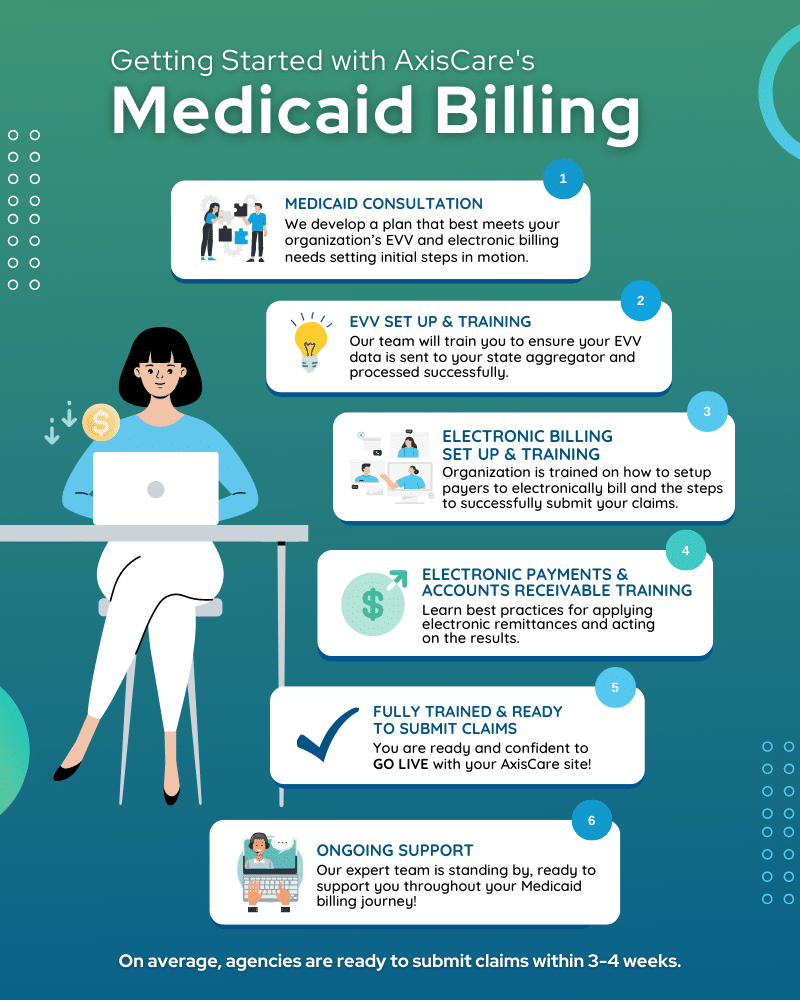How to Choose the Best Home Health Care Software for Your Agency
In many ways, the success and growth of your agency depends on choosing the right home health care software. These platforms have a direct impact on the quality of your client care, your employee satisfaction rates, and how well you meet regulatory requirements. Its added value all boils down to the embedded feature suite, partner software integrations, and the support you receive from your vendor along the way.
Throughout this post, we will guide you through the process of selecting the best home health care software for your agency. From evaluating features and enhancing the user experience to ensuring security and compliance, we’ll cover all the necessary steps that lead to an informed decision.
Step 1: Assess Your Agency’s Unique Needs
Some software may promote itself as a one-size-fits-all solution, but in reality, every agency will have its own set of needs. Before you sign up for a free trial or start comparing providers side-by-side, focus on the player that matters most: yourself.
First, define your care model and the types of services you provide. For skilled home health agencies, clinical documentation, care plans, and Medicare compliance tools will be key. Non-skilled agencies may need more features related to scheduling, caregiver communication, and billing flexibility. Meanwhile, hospice or palliative care agencies typically require features that are tailored specifically to end-of-life care, including bereavement tracking and CHAPS reporting.
Next, take stock of your current situation. How many clients and caregivers do you manage? Do you operate from a single location or does your footprint extend across multiple locations – or even across state lines? Maybe you’re looking to kick off a digital transformation from manual to online systems, or your current software isn’t living up to expectations. If it’s the latter case, make note of where your existing systems are falling short. Then, when you start reviewing vendors, you’ll want to ask about how their platforms can solve those pain points.
Take some time to consider your compliance responsibilities as well. Are you subject to state regulations, federal regulations, or both? Do you bill Medicaid, Medicare, private pay, or a combination thereof? Some agencies will also want to prioritize features like EVV and HIPAA to facilitate their compliance efforts. Something to always keep top-of-mind: your chosen software shouldn’t just check boxes. It needs to make the process of staying above board easier and more automated, too.
Finally, look towards the future. Choosing a platform that simply meets today’s needs is short-sighted; you’ll want to partner with a vendor that can scale alongside you, not one you’ll outgrow in a year’s time. That might mean taking on more clients, adding more staff to your employee roster, or expanding into new territories.
Step 2: Essential Features and Functionality Checklist
Earlier, we mentioned that each agency should be specific about which features apply to their unique situation. And that’s true – but certain functionalities are helpful across the board. No matter which home care software you choose, it should include the following:
- Automated scheduling tools that can intelligently match caregivers to open shifts based on their areas of expertise, the client’s preferences, and other locations along their route.
- Billing integrations that make it easy to send compliant invoices to every type of payer, while avoiding payment delays and rejected submissions due to incomplete information.
- Caregiver management tools that enable intra-team communication, poll their satisfaction rates with detailed surveys, and in a broader sense, a suite of features that lightens their everyday workload.
- EVV integration that simplifies and standardizes the process of tracking visit information, while making it easier to remain compliant with regulations that require it.
- Reporting and analytics that track agency performance over time, including insights like revenue, payroll, hours of care administered, and referrals.
Customization & Scalability
Every agency has its own way of running their business, from how visits are scheduled to how care plans are documented. That’s why customization is a must. Your chosen platform should offer plenty of custom options for creating forms, establishing workflows, and setting user permissions.
Scalability is just as important, especially if you’re planning to grow your business. Your chosen software should be able to handle whatever shifts come your way without requiring a major overhaul, supported by features like multi-site visibility, flexible user licenses, and data that drives strategic decision-making as you expand.
The final piece of the puzzle is keeping pace with industry updates: your software should help you adapt documentation and workflows to reflect broader regulatory changes, while supporting compliance across multiple states or payer sources.
User Experience & Mobile Access
A user-friendly interface, intuitive navigation, and clear workflows are essential for ensuring a smooth onboarding process and minimizing the training timeline.
For starters, the software should have a clean and intuitive design that is easy to navigate for both in-office staff and caregivers in the field. It should also have predefined workflows that guide users through common tasks and daily operations, further reducing friction during onboarding. Mobile-friendly software allows caregivers to access these essential tools and update patient records while they’re on the go, improving communication and efficiency organization-wide.
Even as employees zoom up the learning curve, they may still need a hand from time to time. It’s important to evaluate the quality of training and support offered by the software vendor, which can be found through impartial online review sites and demonstrated through case studies, if available.
Integration Capabilities
An all-in-one software doesn’t have to do the job all by itself. With a little help from partner integrations, users can gain access to an even more robust suite of features that act as an extension of the software. Some vendors may even be compatible with platforms that are already part of your tech stack, making the onboarding process that much smoother.
It’s a good idea to select software that can integrate with foundational tools like EHR, payroll systems, and background checks. Solutions that offer seamless data import and export capabilities, along with robust API options that allow real-time information sharing between systems, create the necessary bridges to achieve true efficiency.
Step 3: Compliance, Security, & Data Privacy
When evaluating home health care software, security and compliance belong at the top of your priority list. Your chosen platform should meet all industry standards for protecting clients’ sensitive information – like HIPAA – and tightly regulate access to their health data.
Begin by taking stock of the software’s security measures: does it offer all of the basics, including data encryption, access controls, audit logs, and user authentication? If you intend on or are currently serving Medicaid clients, ensuring your software of choice is EVV compliant for your state is crucial to serving this population.
Your chosen platform should also have robust backup and disaster recovery measures in place to prevent data loss in the event of a breach – though, even if you’re never targeted by a cyberattack, maintaining a backed-up copy of your records is an industry best practice.
Step 4: Vendor Reputation, Support, & Implementation
Apart from the software itself, it is crucial to evaluate the reputation and support you can expect from your vendor. Research their history, past client experiences, and reputation in the home care industry. Read reviews and testimonials to gauge customer satisfaction from current users; the most reputable resources for this include G2, Capterra, and Software Advice.
Once you’ve made your selection, the support journey begins with implementation, during which the vendor’s team will guide you along the learning curve and ensure you’re set up to make the most of your new platform. Their team should be clear, patient, and above all, responsive. But their responsibility doesn’t end there: weeks, months, and even years after implementation, you may still come across questions or snags that require input from a specialist. The right team will remain by your side every step of the way, always ready to lend a hand.
Step 5: Cost, ROI, & Contract Transparency
Evaluating the cost of home health care software and its return on investment (ROI) is essential for making an informed decision. This process includes determining whether the software requires any initial setup fees, evaluating the ongoing monthly subscription costs based on the features and functionalities you require, and looking out for additional charges like fees for additional users or premium support.
You’ll only be able to paint an accurate picture of these costs if your chosen vendor is transparent about their pricing. Vague estimates or hidden fees can quickly erode trust and blow up your budget, so it’s important to know exactly what you’re paying for. It’s also key to review your contract terms carefully, so you can understand the length of the commitment, cancellation clauses, and any penalties for scaling down or switching providers.
Step 6: Request a Demo
Before finalizing your decision, requesting a demo is the best way to get a feel for your new platform. This will allow you to experience its features and interface firsthand, exploring the feature suite and how it feels to navigate around.
During the demo period, invite a select number of employees to evaluate the software. Ideally, these individuals will become your evangelists on the inside and help lead the discussion.
Step 7: Decision Making & Successful Implementation
After considering all the factors mentioned above, now comes the fun part: decision time! As you draw closer to your final decision, begin planning for software implementation time. This includes tasks such as data migration, staff training, and establishing a timeline for the transition to the new software. Careful planning and effective implementation strategies will help ensure a smooth transition, giving your staff time to integrate with their new platform and maximize its benefits.
- Assign a project lead to coordinate timelines, training, and communication.
- Define success metrics that outline what you want to achieve with the software in the first 3 to 6 months.
- Map current workflows so you can plan the transition without disrupting care.
- Schedule staff training with enough time for familiarization before going live.
- Set a phased rollout (if possible) to test features before full deployment.
- Prepare data for migration by cleaning, verifying, and formatting it for a smooth import.
- Establish vendor communication channels for support during and after launch.
Choose the Perfect Home Health Care Software for Your Agency Today!
Choosing the right home health care software is an investment in your agency’s efficiency, productivity, and quality of care. AxisCare offers all the features you need to excel in the modern home care landscape, while constantly integrating the latest technologies to help you to scale and grow. We’re here to be your partner in home health care: request a free demo to see for yourself.









